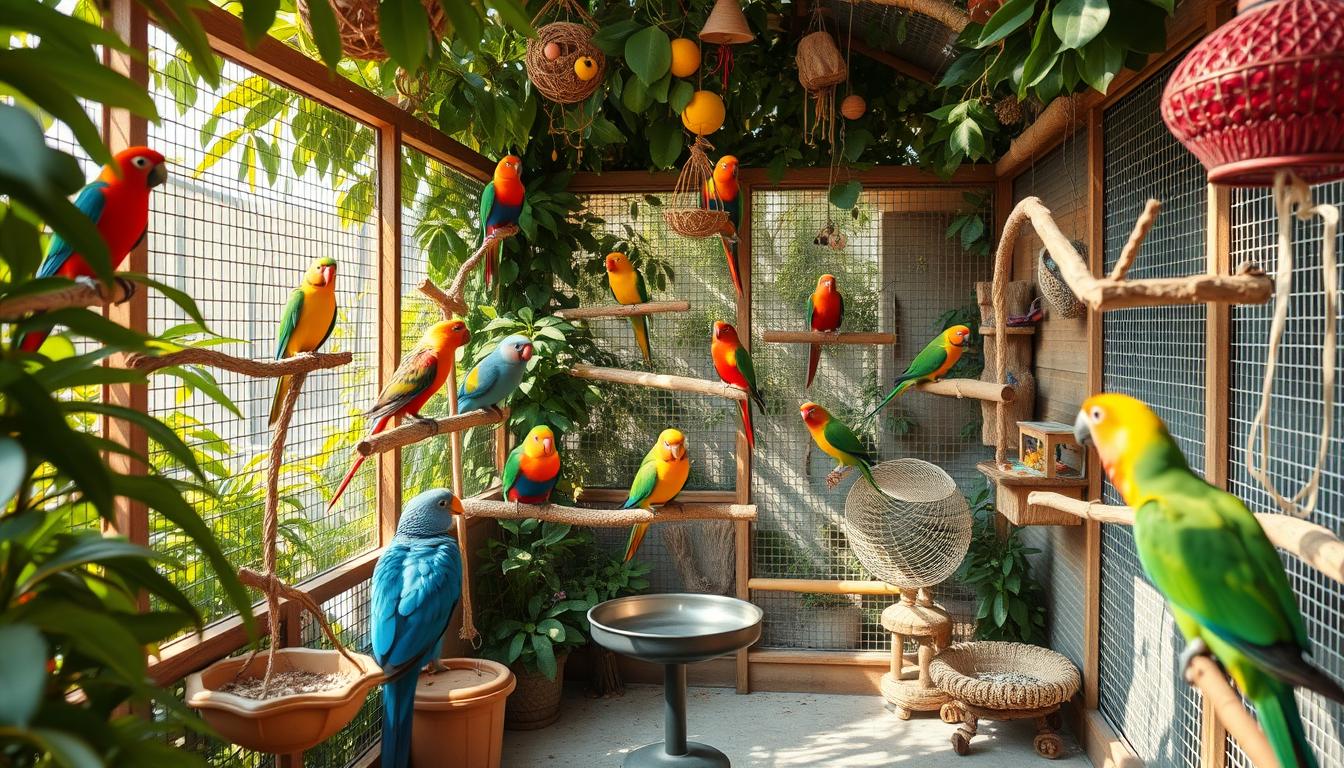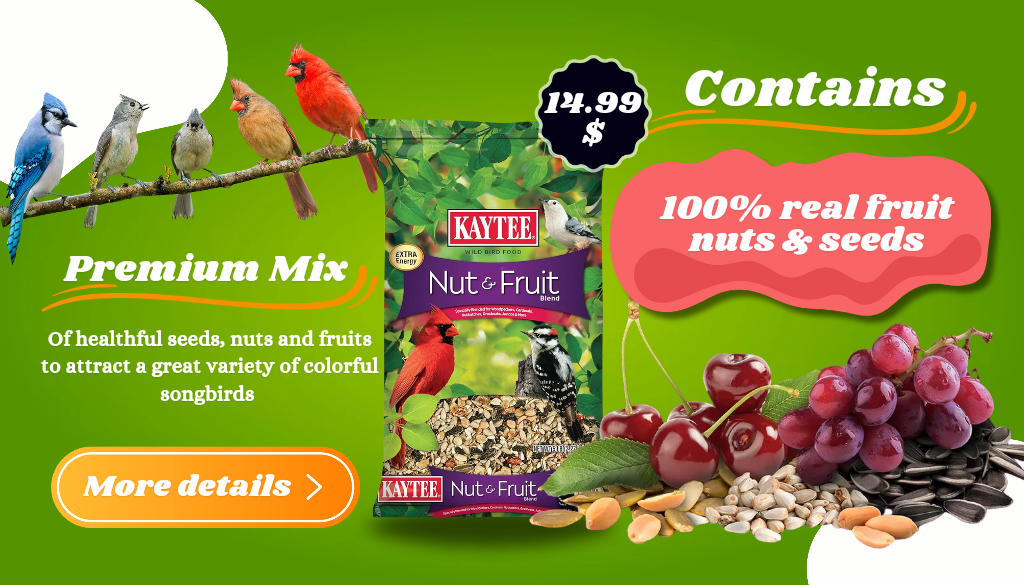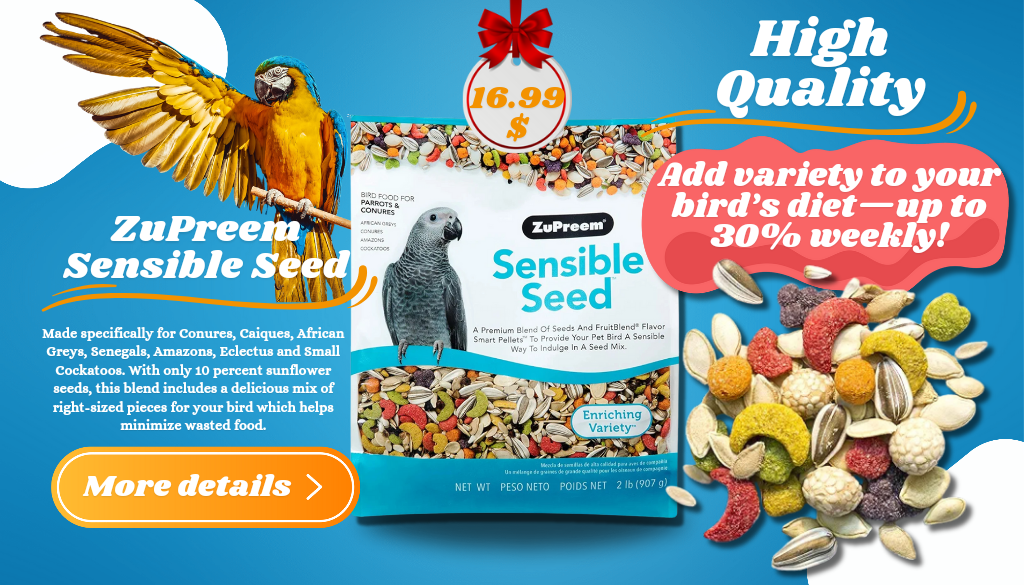Tips for bird Care. Are you a bird enthusiast seeking to create a thriving, happy home for your feathered friends? Look no further! This comprehensive guide is your one-stop-shop for mastering the art of bird care, from nutrition to housing and beyond.
Whether you’re a seasoned bird owner or just starting your avian adventure, you’ll find a wealth of expert-backed insights and practical strategies to ensure your birds’ well-being. From understanding their unique needs to providing the perfect living space, this guide covers it all, empowering you to become a true bird care champion.
Key Takeaways
- Discover the essential elements of creating an optimal habitat for your birds
- Learn about the vital nutrients and dietary requirements to keep your feathered friends healthy and energized
- Explore techniques for building a strong bond with your bird through enrichment and positive reinforcement
- Understand the importance of regular veterinary care and how to identify signs of illness
- Uncover sustainable practices and eco-friendly solutions to support your bird’s well-being and the environment
Understanding Your Bird’s Needs
Caring for a feathered friend requires a deep understanding of their unique needs. Birds are complex creatures, and their habitat, social interactions, and overall well-being must be carefully considered to ensure their safety and happiness. By tailoring your approach to your bird’s specific requirements, you can create an environment that supports their natural behaviors and promotes a thriving, healthy existence.
Choosing the Right Habitat
Different bird species have varying habitat requirements. Some birds thrive in open spaces, while others prefer more enclosed and cozy living areas. Researching the specific needs of your bird’s breed is crucial to providing the ideal home. Factors like cage size, perch placement, and access to natural light can significantly impact a bird’s comfort and well-being.
Importance of Social Interaction
Social interaction plays a vital role in a bird’s mental and emotional health. Many bird species are naturally social and require regular engagement with their owners or other birds, if suitable. Neglecting this need can lead to behavioral issues, such as feather plucking or excessive screaming. Dedicating time each day to bond with your feathered friend and ensuring they have opportunities to interact with their own kind can greatly improve their overall bird behavior and bird safety.
“Birds are not our to love, but to love us. They teach us to be more aware, to be more present, and to be more grateful for the beauty that surrounds us.”
Nutrition and Diet for Birds
Providing the right nutrition is crucial for the overall health and well-being of your feathered friends. Birds have specific dietary requirements that vary based on their species, age, and activity level. Understanding these needs is the key to ensuring your bird stays healthy and thrives.
Essential Nutrients Every Bird Needs
Birds require a balanced diet consisting of proteins, carbohydrates, fats, vitamins, and minerals. Proteins help with muscle and tissue growth, while carbohydrates and fats provide energy. Essential vitamins and minerals support immune function, bone health, and various bodily processes.
- Proteins: Found in seeds, nuts, and some fruits and vegetables
- Carbohydrates: Obtained from grains, fruits, and vegetables
- Fats: Derived from nuts, seeds, and certain oils
- Vitamins and minerals: Crucial for overall health and well-being
Safe Foods vs. Foods to Avoid
When it comes to feeding your bird, it’s essential to know which foods are safe and which to avoid. The appropriate diet varies by species, but generally, birds thrive on a mix of seeds, fruits, and vegetables. Steer clear of foods like avocado, chocolate, and caffeine, as they can be toxic to birds.
| Safe Foods | Foods to Avoid |
|---|---|
|
|
Hydration: Importance of Fresh Water
Adequate hydration is essential for bird health. Ensure your feathered friend always has access to clean, fresh water. Change the water daily to prevent bacterial growth and provide a clean, safe drinking source.
Creating a Comfortable Living Space
Providing your feathered friend with a comfortable and stimulating living space is essential for their overall well-being. The ideal bird housing and bird supplies can make all the difference in ensuring your bird thrives in captivity.
Ideal Cage Size and Setup
The size of the cage should be proportional to the bird’s species and size, allowing them ample room to move around and spread their wings. As a general rule, the cage should be at least three times the length of the bird’s wingspan. A spacious and well-designed enclosure will not only keep your bird physically healthy but also cater to their natural behavioral needs.
Perches and Bedding Options
- Incorporate a variety of perches with different diameters and textures to mimic the bird’s natural environment and promote foot health.
- Choose bedding materials that are soft, absorbent, and easy to clean, such as newspaper, paper towels, or bird-safe litter.
- Provide areas for feeding, bathing, and playing to ensure your bird’s comfort and stimulation.
By creating a comfortable and enriching living space, you can help your bird thrive and maintain a healthy and happy lifestyle. Remember, the investment in high-quality bird housing and bird supplies is essential for your feathered companion’s well-being.
“A happy bird is a healthy bird, and a comfortable living space is the foundation for their overall well-being.”
Regular Veterinary Care
Maintaining the health and well-being of our feathered friends is of utmost importance, and regular veterinary check-ups play a crucial role in ensuring their long-term happiness. As bird owners, we must be proactive in seeking the expertise of experienced avian veterinarians to monitor our avian companions’ health and address any potential issues before they escalate.
Finding an Avian Vet
Locating a qualified avian veterinarian in your area can make a significant difference in the quality of care your bird receives. Avian vets are specially trained to understand the unique needs and challenges of bird health, from proper nutrition to disease prevention. When selecting an avian vet, consider factors such as their experience, the clinic’s facilities, and the availability of emergency services.
Routine Check-ups and Vaccinations
Regular check-ups, typically scheduled at least once a year, allow your avian veterinarian to monitor your bird’s overall health and catch any potential problems early on. During these visits, your vet may recommend necessary vaccinations, such as those for highly contagious diseases like Pacheco’s disease or avian influenza. These preventative measures can significantly reduce the risk of illness and ensure your feathered companion’s long-term bird health and bird safety.

By prioritizing regular veterinary care, you can help ensure your bird’s optimal health and well-being, allowing you both to enjoy many happy years together. Remember, proactive care is the key to maintaining a healthy and thriving avian companion.
Behavioral Enrichment for Birds
Providing mental stimulation is crucial for the well-being of our feathered companions. Bird behavior and bird training techniques can play a vital role in ensuring our birds live happy, fulfilled lives. By introducing a variety of engaging toys and activities, we can encourage natural behaviors like foraging, problem-solving, and exploration, while also strengthening the bond between bird and owner.
Toys and Activities to Keep Birds Engaged
- Rotate a selection of toys regularly to maintain your bird’s interest and prevent boredom. Offer a mix of puzzle feeders, chewable toys, and perches that encourage physical activity.
- Incorporate foraging opportunities by hiding your bird’s favorite treats in paper bags, cardboard tubes, or shredded paper, allowing them to use their natural instincts to uncover the rewards.
- Provide a variety of perches in different shapes, textures, and sizes to encourage your bird to exercise their feet and legs.
Training Techniques for Better Behavior
Positive reinforcement training is a highly effective way to improve your bird’s behavior and strengthen the bond between you. By rewarding desired behaviors with treats or praise, you can teach your bird to perform various tricks and commands, while also addressing any unwanted behaviors.
“Behavioral enrichment has been shown to reduce repetitive behaviors in animal disease models and zoological settings, but the underlying neurobiological mechanisms are not well understood.”
Consistent training sessions, coupled with a patient and understanding approach, can yield remarkable results. Remember, every bird is unique, so be prepared to tailor your training techniques to your feathered friend’s individual needs and preferences.
By prioritizing behavioral enrichment and incorporating positive reinforcement training, you can foster a happy, well-adjusted bird and create a stronger connection with your feathered companion.
Grooming and Hygiene Practices
Maintaining proper grooming and hygiene is essential for the health and well-being of your feathered friend. Regular bird grooming not only helps keep your pet’s plumage in top condition but also promotes overall bird health. From bathing to nail clipping, let’s explore the key aspects of grooming and hygiene practices for your beloved bird.
Bathing Your Bird Properly
Bathing is an important part of a bird’s grooming routine. Offer your bird a shallow dish or gentle spray of water to allow it to bathe at its own pace. This helps keep the feathers in optimal condition and aids in the natural preening process. Be sure to provide a safe, stress-free environment during bath time, and never force your bird into the water.
Nail Clipping and Feather Care
Over time, a bird’s nails can grow too long, potentially leading to discomfort or even injury. Regularly trimming your bird’s nails can help prevent these issues. Consult an avian veterinarian or experienced groomer to learn the proper techniques for safe and gentle nail clipping. Additionally, ensuring your bird has a balanced diet rich in nutrients is essential for maintaining healthy, vibrant plumage.
Grooming and hygiene practices play a crucial role in maintaining the overall bird health and well-being of your feathered companion. By providing proper bird grooming care, you can help keep your bird looking and feeling its best.
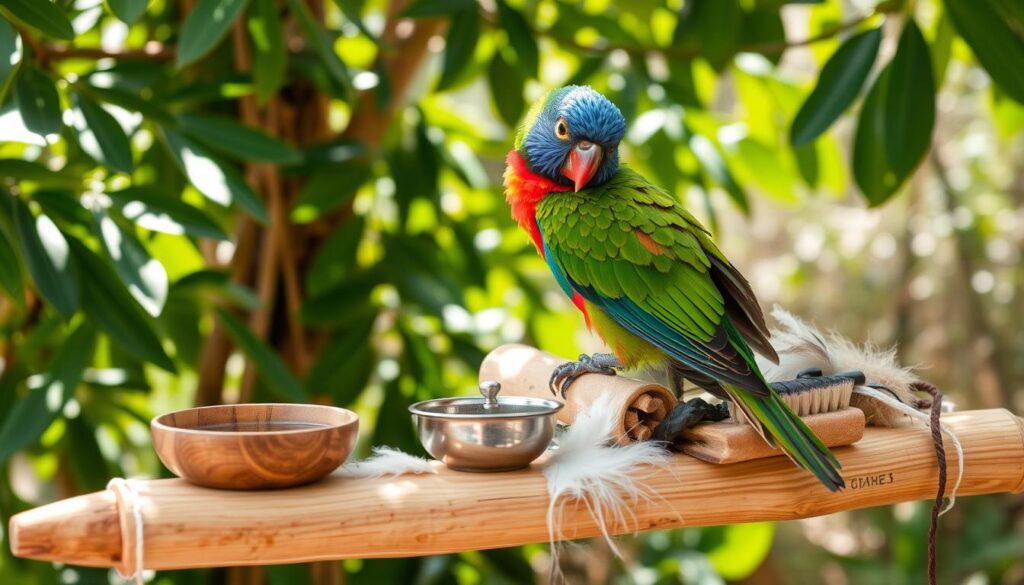
Seasonal Care Tips for Birds
As the seasons change, bird owners must adapt their care routines to ensure the safety and well-being of their feathered friends. Maintaining proper temperature, humidity, and dietary adjustments are crucial for bird health and safety throughout the year.
Managing Temperature Changes
Birds are sensitive to fluctuations in temperature, so it’s essential to maintain a consistent indoor environment. Avoid drafts and sudden changes in temperature, which can be stressful for your bird. During the colder months, consider increasing the humidity levels and providing supplemental heating if necessary, especially for birds housed in outdoor aviaries.
Safe Practices for Bird Care in Winter
- Ensure that outdoor aviaries have adequate shelter and heating to protect birds from the elements.
- Adjust your bird’s diet to meet their increased energy needs during the colder seasons, providing more high-calorie foods.
- Monitor your bird’s feather condition and provide proper bathing and grooming to maintain their health and safety.
- Be mindful of potential hazards, such as slippery surfaces or toxic chemicals used for winter maintenance, that could pose a risk to your bird.
By staying vigilant and adapting your bird care routine to the changing seasons, you can ensure your feathered companion remains safe, healthy, and thriving throughout the year.
| Season | Temperature Considerations | Dietary Adjustments | Grooming Needs |
|---|---|---|---|
| Winter | Maintain consistent indoor temperature, provide supplemental heating if needed | Increase high-calorie foods to meet energy demands | Monitor feather condition, provide regular bathing and grooming |
| Spring | Gradual temperature changes, watch for drafts | Transition to a more varied, nutrient-rich diet | Adjust grooming routine as birds shed winter feathers |
| Summer | Ensure adequate ventilation and cooling to prevent heat stress | Provide hydrating, low-calorie foods | Regular bathing to help birds regulate body temperature |
| Fall | Gradually decrease temperature as needed | Increase high-energy foods to prepare for winter | Monitor feather condition and provide necessary grooming |
By understanding the unique seasonal needs of birds and implementing appropriate care practices, you can help ensure your feathered companions remain comfortable, healthy, and safe throughout the year.
Recognizing Signs of Illness in Birds
As bird owners, it’s crucial to be vigilant about our feathered friends’ health. Birds often hide signs of illness, making it essential to closely monitor their behavior and appearance for any changes. By understanding the common health issues and knowing when to seek veterinary help, we can ensure the bird’s safety and well-being.
Common Health Issues to Watch For
- Respiratory problems: Look for signs of difficulty breathing, such as open-mouth breathing, wheezing, or coughing.
- Digestive issues: Pay attention to changes in droppings, such as diarrhea or constipation, as well as loss of appetite.
- Feather plucking: Excessive feather loss or bald patches can indicate stress or an underlying health condition.
When to Seek Veterinary Help
If you notice any concerning symptoms, it’s best to seek immediate veterinary care. Signs like lethargy, significant changes in eating habits, or difficulty breathing require prompt attention. A qualified avian veterinarian can properly diagnose and treat any health issues, ensuring your bird’s well-being.
“Maintaining the health and safety of our feathered companions is a top priority. By staying vigilant and addressing any signs of illness promptly, we can help our birds thrive and enjoy a long, happy life.”
| Health Issue | Symptoms | Recommended Action |
|---|---|---|
| Respiratory Problems | Difficulty breathing, wheezing, coughing | Seek immediate veterinary care |
| Digestive Issues | Changes in droppings, loss of appetite | Monitor closely and consult a vet if symptoms persist |
| Feather Plucking | Excessive feather loss or bald patches | Identify and address underlying causes with the help of a vet |
Bonding with Your Bird
Building a strong bond with your feathered companion requires patience, consistency, and a genuine understanding of your bird’s behavior. By investing quality time in daily interactions, you can foster a relationship of trust and mutual respect that will benefit both you and your bird.
Building Trust and Understanding
Spend time each day engaging with your bird through gentle handling, positive reinforcement training, and simply observing its behavior. Pay close attention to your bird’s body language and moods, learning to respond accordingly. This open communication and respect for your bird’s needs will help build a foundation of trust, allowing your bond to deepen over time.
The Importance of Time Spent Together
Regular, quality time spent with your bird is essential for nurturing your relationship. Engage in activities such as bird training, which can improve your bird’s behavior and strengthen your connection. Talking to your bird, offering treats, and participating in playtime all contribute to a stronger bond and a happier, more well-adjusted pet.
“The time you spend with your bird is an investment in your relationship. The more you can learn about their individual personalities and needs, the better you’ll be able to meet their requirements and build a meaningful connection.”
Bonding with your bird requires patience, consistency, and a genuine understanding of your feathered friend’s needs. By dedicating time to daily interactions and observing their behavior, you can establish a foundation of trust that will lead to a rewarding and lifelong relationship.
| Activity | Benefits |
|---|---|
| Positive Reinforcement Training | Improves bird behavior, strengthens bond |
| Gentle Handling and Playtime | Builds trust, provides mental stimulation |
| Talking and Offering Treats | Enhances communication, reinforces positive associations |
Bird Care While Traveling
When you’re planning a trip, it’s important to consider the well-being of your feathered friends. Proper preparation and finding the right caregivers can ensure your bird’s safety and comfort while you’re away. Let’s explore some essential tips for caring for your bird during travel.
Preparing for Trips with Birds
Before hitting the road or taking to the skies, make sure your bird’s travel accommodations are secure and comfortable. Choose a carrier designed specifically for avian transport, equipped with perches, food and water dishes, and any familiar toys or bedding. Pack your bird’s favorite foods to maintain their regular diet, and don’t forget to bring any necessary medications or supplements.
Finding Caregivers and Safe Transportation
- If you’re leaving your bird at home, it’s crucial to find an experienced caregiver who is familiar with bird care. Provide detailed instructions on feeding, cleaning, and any special needs your bird may have.
- Make sure to leave emergency contact information and the number of your avian veterinarian in case any issues arise.
- When transporting your bird, keep their environment as stable and secure as possible. Avoid exposing them to loud noises, sudden movements, or extreme temperatures.
By planning ahead and choosing the right caregivers and transportation methods, you can help ensure your bird’s safety and well-being while you’re away. Remember, their comfort and security should be a top priority during any travel adventure.
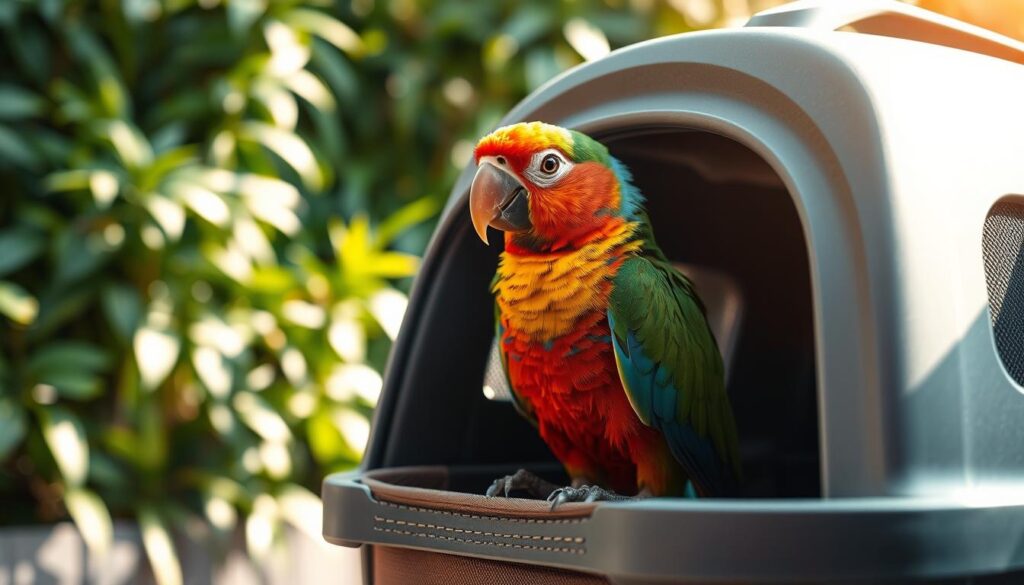
“Proper preparation and finding the right caregivers can ensure your bird’s safety and comfort while you’re away.”
Sustainability in Bird Ownership
As responsible bird owners, we have a duty to adopt eco-friendly practices that minimize our impact on the environment. By making sustainable choices, we can not only provide exceptional care for our feathered companions but also contribute to the conservation of wild bird populations.
Eco-Friendly Products and Practices
When it comes to bird supplies, opt for natural and biodegradable options. Choose perches made from sustainable wood or natural materials, and select toys and accessories that are free of harmful chemicals. Utilise recycled paper or eco-friendly bedding for your bird’s cage, reducing waste and supporting a circular economy.
- Invest in natural, sustainable perches and toys
- Use recycled or biodegradable cage liners and bedding
- Avoid single-use plastics and opt for reusable bird supplies
Supporting Bird Conservation Efforts
Beyond adopting sustainable practices in your own bird care, you can also make a meaningful difference by supporting conservation initiatives. Research and connect with local wildlife organizations or national bird conservation groups to find opportunities to volunteer or contribute financially. By raising awareness and advocating for the protection of bird habitats, you can help ensure a brighter future for our feathered friends.
- Volunteer with local wildlife organizations
- Donate to national bird conservation efforts
- Educate others on responsible bird ownership and conservation
Remember, every small step towards sustainability and conservation can have a lasting impact. By embracing eco-friendly bird supplies and actively supporting bird protection, we can create a more harmonious and sustainable future for both our beloved pets and the wild bird populations that enrich our world.
| Eco-Friendly Bird Supplies | Conventional Bird Supplies |
|---|---|
| Natural wood perches | Plastic or metal perches |
| Biodegradable cage liners | Disposable paper liners |
| Sustainable toys and accessories | Synthetic or plastic toys |
“The future of our planet and the well-being of our feathered friends are inextricably linked. By embracing sustainable practices in bird care, we can create a better world for all.” – Dr. Avian Ecologist
Resources for Bird Care Education
Enhance your knowledge and skills in bird care by exploring a wealth of educational resources. From informative books and authoritative websites to engaging community groups and online courses, there are numerous avenues to deepen your understanding and provide the best possible care for your feathered companion.
Books, Websites, and Community Groups
Start your journey by delving into the extensive library of bird care books written by renowned avian experts. These comprehensive guides cover a wide range of topics, from the basics of bird behavior and nutrition to advanced tips for *tips for bird care* and *bird breeding*. Complement your reading with a visit to reputable bird-focused websites, where you can access the latest research, tips, and advice from fellow enthusiasts.
Joining local or online bird enthusiast groups can also be a valuable resource. These communities offer a platform to connect with other bird owners, share experiences, and seek guidance from experienced caretakers. Engaging with like-minded individuals can provide invaluable insights and support as you navigate the rewarding world of bird ownership.
Workshops and Online Courses
For a more immersive learning experience, consider attending workshops or enrolling in online courses offered by avian experts or veterinary institutions. These educational opportunities delve deeper into various aspects of bird care, covering topics such as behavior, nutrition, health, and breeding. Hands-on workshops may even provide the chance to practice certain skills, like grooming or training, under the guidance of knowledgeable instructors.
By harnessing the power of these diverse educational resources, you can stay informed, continuously improve your bird care practices, and ensure your feathered companion receives the best possible care and attention.

